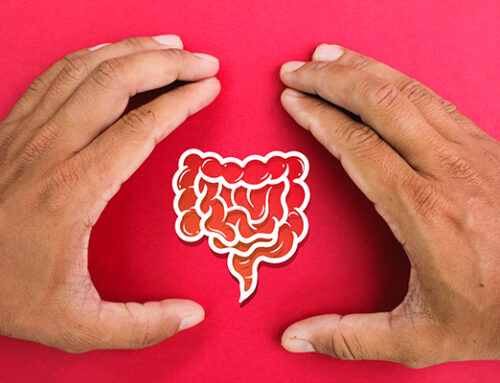Do you believe that what you eat directly affects your state of mind and, in turn, your state of mind affects your digestion? Interestingly, this statement is true. Scientists have established a significant relationship between stress levels and overall quality of life, particularly in the context of gut health and gastrointestinal disorders, which affect 40% of individuals at any given time. This blog post discusses the relationship between the gut, microbes, and the brain. I will also share some tips to help you improve your gut health.
What is the Gut-Brain Axis?
The gut-brain axis portrays a dynamic communication between the central nervous system and the gastrointestinal tract by using signaling hormones and messengers to regulate daily activities and emotions. A key component in this intricate system is our microbiome—the community of microorganisms, predominantly bacteria, residing in our gut that directly influences the messages transmitted throughout our bodies.
Recent studies show beyond doubt that there is an interaction between the microbes in our gut and the brain. When you are in a good state of mind, it allows for a healthier, well-balanced microbiome. Equally, acute stress and chronic stress will alter your microbiome balance negatively. More on this shortly.
Moreover, studies affirm that individuals with depression and anxiety exhibit lower bacterial diversity in their guts, and some specific bacteria may contribute to non-situational depression and/or anxiety.
Stress and the Body
In response to perceived or actual stress, the body releases cortisol. Cortisol is important for the stress response, but it also has implications for your gut health, including;
- Drawing blood away from the gut to muscles
- Slowing down saliva production
- Impairing digestion
- Decreasing prostaglandins that protect the stomach from acid and influence immune system activity.
Ultimately, prolonged stress leads to inadequate digestion and can disrupt the delicate ecosystem in the gut.
On the other hand, research studies show that food is processed better when one is in a stress-free, relaxed, and calm state. In such a situation, well-nourished and diverse microbes enhance the secretion and communication of serotonin, the happy hormone. Serotonin uplifts mood, promotes calmness, and contributes to positive living.
Tips To Improve Gut-Brain Health
Given this scientific background, the question remains: how does one navigate the complex interplay of emotions, dietary choices, work, and daily life without succumbing to stress? Here are our tips to help you:
1. De-stress
Do your best to de-stress regularly. You can look back and identify activities you enjoy that help you relax after a long day. De-stressing activities include but are not limited to yoga classes, spending quality time with friends and families, painting, a walk around the block, and fishing. Engaging in these activities provides an escape from the stressors of daily life.
2. Be Relaxed Before Eating
Avoid eating on the go; instead, sit down without distractions (like your phone) and focus on your food. Take a moment to breathe deeply before meals to promote a ‘rest and digest’ state.
3. Keep a Stress Diary
You need to understand the root causes of your stress, whether it is familial worries, intense workouts, inadequate sleep, or work-related concerns, to tackle the problem. Keeping a stress diary helps you plan your activities, know yourself better, and enhance self-awareness for better stress management. We have a Gut diary that can help you stay on top of your food game: what, when, and how you eat. This diary includes Gut-started pages, the Gut Stuff Stool Chart, and extra pages for your weekly shopping lists. Get yours here.
Closing Thoughts
According to the scientifically-backed Gut-Brain Axis theory, what you eat affects your state of mind, and similarly, your state of mind affects your digestion. Proper stress management strategies like keeping a stress and gut diary improves your overall health and well-being. After implementing these tips, chill out and trust in the intelligence of your gut microbiome; those little microbes are smarter than you think!
References
De Palma, G., Collins, S. M., Bercik, P., & Verdu, E. F. (2014). The microbiota–gut–brain axis in gastrointestinal disorders: stressed bugs, stressed brain or both?. The Journal of physiology, 592(14), 2989-2997.
Moloney, R. D., Johnson, A. C., O’mahony, S. M., Dinan, T. G., Greenwood‐Van Meerveld, B., & Cryan, J. F. (2016). Stress and the microbiota–gut–brain axis in visceral pain: relevance to irritable bowel syndrome. CNS neuroscience & therapeutics, 22(2), 102-117.
Valles-Colomer, M., Falony, G., Darzi, Y. et al. The neuroactive potential of the human gut microbiota in quality of life and depression. Nat Microbiol 4, 623–632 (2019) doi:10.1038/s41564-018-0337-x
https://www.nhs.uk/live-well/eat-well/common-digestive-problems-and-how-to-treat-them/
MAYER, E. The neurobiology of stress and gastrointestinal disease
Gut 2000;47:861-869.
Yaribeygi H, Panahi Y, Sahraei H, Johnston TP, Sahebkar A. The impact of stress on body function: A review. EXCLI J. 2017;16:1057–1072. Published 2017 Jul 21. doi:10.17179/excli2017-480







